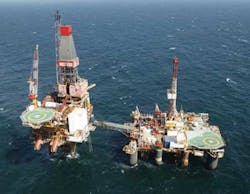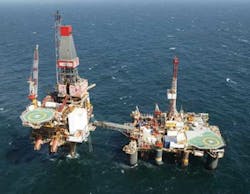Software system upgrades enhance safety, efficiency
Adam Howard
Rockwell Automation
Total E&P UK Ltd. recently completed an upgrade of several key software systems on its Dunbar and North Alwyn platforms in the North Sea, as part of efforts to maintain production and enhance safety.
The upgrade included updates to the platforms' process control systems (PCS), emergency shutdown (ESD) systems, fire and gas (F&G) safety systems, and vibration monitoring systems.
To complete the upgrade, Total called upon Rockwell Automation to supply engineers, components, and support for a number of systems upgrade across the two platforms. The majority of the work took place on the Dunbar facility.
Alwyn area facilities
Total E&P UK Ltd. is one of the main oil and gas operators on the UK continental shelf, where it continues to invest heavily. Employing around 750 staff at its Aberdeen headquarters, the company's portfolio includes operatorship of the Alwyn area fields, the high pressure/high temperature Elgin and Franklin fields, the St Fergus gas terminal, and a number of non-operated fields.
The North Alwyn complex, located on the UK continental shelf 440 km (273 mi) northeast of Aberdeen, commenced production in 1987. The Dunbar platform, located 22 km (13.6 mi) to the south of the North Alwyn complex, exports oil and gas to North Alwyn via a multi-phase pipeline which commenced production in 1994. Dunbar is a minimum-facilities platform with minimal process facilities, a drilling derrick, and living quarters. Electrical power is supplied from the North Alwyn generators via two submarine cables. The Alwyn area produces approximately 100,000 boe/d.
Key objectives
The primary challenge faced by the engineers was the safe delivery of an upgraded control and safety system with minimal disruption to operations. Crews also had limited windows in which to complete the work, with just two opportunities to do the upgrades. The first was during a planned shutdown period – normally two or three weeks in the summer period. The second was through concurrent replacement of running components and infrastructure elements prior to the shutdown.
Overall, the main objectives were to replace system components to overcome spurious trips and major obsolescence issues, while having spares available until at least 2020; provide the facility for future remote operation of Dunbar from North Alwyn; implement a cost-effective upgrade with minimal risk to production; and, of vital importance, complete the upgrade with no risk to the safety of the platform, personnel, or the environment. Satisfaction of this final objective was considered a great success in the overall project, with the engineers from Rockwell Automation being nominated for a Health & Safety award.
Solution strategy
The strategy for the upgrade comprised a number of individual but not mutually exclusive steps. The PCS was upgraded prior to the shutdown, being installed in tandem with the existing system to maintain production capacity. The F&G system was also upgraded prior to the shutdown, and the ESD solution was upgraded during the shutdown in parallel with the other new systems being bought online.
Rockwell Automation was assigned as EPC contractor with responsibilities for placing orders with all equipment vendors, completion of all detailed engineering, organizing control and shipment of all materials to site, supervision of vendor site installation and commissioning activities, and management of the subcontractors. It upgraded the ESD and F&G systems with a single Trusted triple modular redundant (TMR) ESD controller and a single Trusted TMR F&G controller.
Trusted is a fault-tolerant control and safety system that meets the most stringent international safety standards. This technology helps preserve the integrity of a control system that could – if it failed – compromise process profitability. It has triplicated processing paths (slices) within each module, along with high levels of diagnostics and voting between the paths to produce a fault tolerant architecture with excellent reliability.
Unlike non-TMR control systems, Trusted gives virtually 100% uptime, without compromise to the safety or integrity of the system. It is approved to TUV AK6, the highest possible rating for programmable safety systems, and also carries approvals for NFPA72 and Gosstandart of Russia.
The existing system comprised an ICS 2000, a legacy safety system from Rockwell Automation. The Dunbar system upgrade (DSU) replaced the processor and output subsystem with the Trusted processors, and engineers were also able to perform controlled online (maintaining production) migration of the upgrade by doing a large amount of planning and risk assessment beforehand.
One of the potential features of the new installation will be the ability to control elements of Dunbar from Alwyn. The legacy system was designed to incorporate this feature, but it was never used. However, it is envisioned that it may be put to use in the future. "The primary drive was down to reliability," said Derek Thomson, E&I Projects Manager, Total E&P. "We are now into phase two of the upgrade project with Rockwell Automation, reinforcing the progress we have made to date."
Offshore Articles Archives
View Oil and Gas Articles on PennEnergy.com

